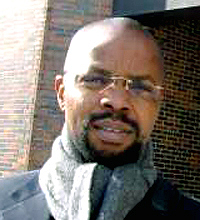
Akin Adesokan
Amatoritsero Ede
Angela Nwosu
A. Quarcoopome
Aryan Kaganof
Chi Onyemelukwe
Chuma Nwokolo
David Chislett
Domi Chirongo
Eyitemi
Egwuenu
Firoze Manji
Gabriel Okara
Grace Kim
Isabella Morris
JKS Makokha
Kangsen Wakai
Khumbu. Mpofu
Khaled Khamissi
Linda Saunders
M. Mashigoane
James Currey
Noelle Bolou
Nourdin
Bejjit
Ondjaki
Okey Nwamadi
Patricia
J. Wesley
Paula
Akugizibwe
Phephelaphi Dube
Rassool Snyman
Sonja Porle
Sumaila Umaisha
Uche Nduka
Uduak
Isong O.




Credits:
Ntone Edjabe
Rudolf
Okonkwo
Tolu
Ogunlesi
Yomi
Ola
Molara Wood



|
|
|
Things Fall Apart, by Chinua Achebe
|
|
|
|
 |
|
|
|
|
|
|
|
|
|
|
 |
|
|
|
|
|
|
|
 |
|
|
Cheluchi
Onyemelukwe is a doctoral candidate in law at Dalhousie Uni, Canada.
Growing up, I read a lot
of books, including Achebe’s Things Fall Apart. The
book is not a just a pioneering novel telling the African story
from an African perspective, it is part of my history. An Igbo myself,
for many years I considered it not just fiction but a true history
of the Igbo. Long before I understood the history of my own family,
I imagined my ancestors, tall and proud like Okonkwo, living in
an organized society, rich in customs, full of intelligent and good
people, with very human failings. Reading its almost flawless translation
of the Igbo language into English (perfected in Achebe’s
Arrow of God) and its beautiful use of proverbs, always made
me wonder if others who could not understand Igbo could truly and
fully appreciate this wonderful book. It gave me a sense of place,
and an appreciation for the richness of my language, which will
always be with me. My take on Things Fall Apart is thus
always, not a literary critic’s perspective, or a high school
teacher’s summary, or even a regular reader’s view on
a good book, but instinctively an emotional (some might say sentimental)
embrace of an important and pleasant life event. The story this
important book tells is part of my personal narrative, part of who
I am. |
|
|
|
|
|
|
|
|
|
|
|
|
|
|
|
|
|
|
|
|
|
|
|
|
|
|
|
|
|
|
|
|
|
|

|
|
|
|
Amatoritsero Ede is
a poet, Doctoral Candidate in English at Carleton University, Ottawa
Canada, and the Publisher & Managing Editor of Maple Tree Literary
Supplement (www.mtls.ca) |
|
|
 |
|
|
|
|
My first
impression of this evocative story of an impatient and irascible
Okonkwo – who ‘almost hated’ his layabout mendicant
artist father, for the older man’s non-achievement –
was gripping. There was an eerie, almost meta-fictional quality
to the figure of Okonkwo, who, against African traditional veneration
for age, only considered success as the measure of a man. In that
sense he is, ironically, a very modern character even if his successes
were built on a traditional insistence on the sometimes –
in the novel – ritualised progression from boyhood into manhood.
His tempestuous personality, which drove him to success, was also
his tragic flaw; it led to his self-defeat – exile, suicide,
and a complete and final symbolic banishment from communal memory
as his corpse was unceremoniously dumped in the ‘evil forest’.
In the end he is a modern character who is defeated by tradition,
while following tradition. |
|
|
|
|
|
|
|
|
|
|
|
|
|
|
|
|
|
|
|
|
|
|
|
|
|
|
|
|
|
|
|
|
|
|
|
|
|
|
|
|
|
|
|
|
|











![]()
![]()
![]()
![]()


